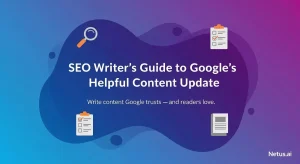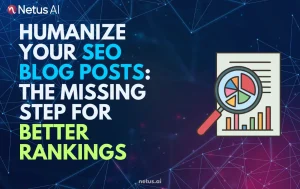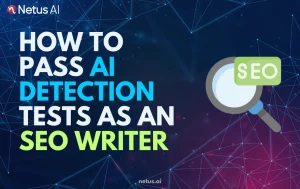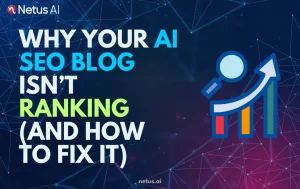
Why Google’s ‘Who, How, Why’ Framework Matters for EEAT | NetusAI
Why Google’s ‘Who, How, Why’ Framework Matters for EEAT AI can create articles in seconds. But here’s the truth: speed is not enough. Google wants

Content writer and editor for Netus.AI
How Your Fight Against Plagiarism Can Keep You Out of Trouble.
Plagiarism is a growing concern in the world of writing and academia, with the rise of online platforms contributing to increased instances of both intentional and unintentional plagiarism.
It is crucial for students and writers to be aware of the potential consequences of plagiarism, as it is considered a form of theft and can severely damage one’s career and reputation.
Understanding the various forms of plagiarism and taking appropriate steps to prevent it in their work is essential for maintaining academic integrity and producing original content.
Whether it’s a student writing a dissertation paper or an online content creator, individuals must take the initiative to educate themselves on the pitfalls of plagiarism and learn to navigate these challenges.
This includes being informed on proper citation methods and recognizing instances when direct quotations and source attributions are necessary. By doing so, writers can take control of their work’s originality and build trust with their readers.
Writers and students must always prioritize originality in their work to maintain credibility and demonstrate their knowledge. To avoid plagiarism while producing content, the following steps can be beneficial for both writers and students:
By following these steps, both writers and students can create plagiarism-free content that showcases their thought process, ideas, and knowledge in a professionally acceptable manner.
To ensure your writing is free from plagiarism, it is essential to know when and how to appropriately cite various sources. Different citation styles such as APA, MLA, and Chicago can be employed according to the writer’s preference or the requirements of their work.
In summary, proper attribution and accurate citation of external sources are vital for maintaining the integrity and credibility of your research paper or project. By honoring the original creators’ ideas and diligently following the guidelines of your preferred citation style, your academic writing will remain ethical and professional.
Employing a plagiarism checker is crucial before submitting any work.
This technology, such as Grammarly or Turnitin, helps writers ensure originality in their content. Simply upload the work to the tool, and it thoroughly scans the content.
Through this scan, the plagiarism checker identifies similarities with existing online assignments.
After scanning, the plagiarism checker tool generates a detailed report along with a plagiarism percentage. It also highlights areas that require proper citations and provides source links to aid in revision. These steps assist writers in battling plagiarism while producing original papers.
The consequences of committing plagiarism in an academic setting can be severe and may include automatic failure of the paper, failure of the class, and a report to the Dean of Students.
If you are accused of plagiarism, it is important to familiarize yourself with your university’s policy and procedures for handling such situations. Consult with academic advisors or faculty members for guidance and assistance in proving your innocence or resolving the issue.
To avoid plagiarism when writing an essay or report, keep track of your sources, paraphrase or quote when necessary, and make sure to give credit to the original author through in-text citations and a bibliography.
To demonstrate that your work is original and not plagiarized, use tools like plagiarism checkers to verify the uniqueness of your content. Also, properly cite your sources and use paraphrasing techniques to present information in your own words.
A student may potentially be exonerated from a plagiarism accusation if they can provide evidence proving their innocence. This may include documentation of their research process, drafts written along the way, or demonstrating that similarities are coincidental or common knowledge.
To effectively challenge plagiarism allegations, gather evidence supporting your innocence and present it to the relevant authority, such as your instructor or a university committee. Make sure to follow your institution’s guidelines and procedures for handling such cases.
Related posts

Why Google’s ‘Who, How, Why’ Framework Matters for EEAT AI can create articles in seconds. But here’s the truth: speed is not enough. Google wants

SEO Writer’s Guide to Google’s Helpful Content Update Keeping up with Google’s algorithm changes can feel like a relentless game of whack-a-mole. Just when you

Can AI Content Be Safe for SEO in 2025? Let’s start with the question of keeping every content strategist, SEO pro and blogger awake at

Humanize Your SEO Blog Posts: The Missing Step for Better Rankings You’ve done everything by the book. Your keyword research is impeccable. Your meta descriptions

How to Pass AI Detection Tests as an SEO Writer Let’s paint a familiar picture. You’ve just finished a blog post. The headline is sharp,

Why Your AI SEO Blog Isn’t Ranking (And How to Fix It) You embraced AI for your blog. The promise was intoxicating: high-quality content, published
@ 2024 Netus AI.